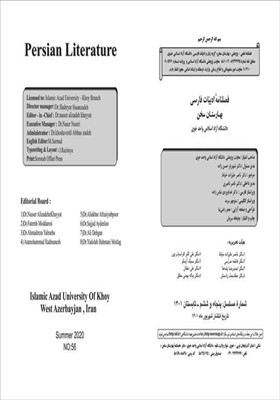The Analysis of thematical metaphor of God in Attar's Diwan
Subject Areas :
Abstract Articles
Lida Paydar
1
,
Jahandoost Sabzali pour
2
,
Khoda Bakhsh Assadollahi
3
,
Sowrollah Nowruzi Davudkhani
4
1 - Ph,D. student in Persian language and literature, Khalkhal branch, Islamic Azad University, Khalkhal, Iran
2 - Associate Professor, Department of Persian Language and Literature, Rasht Branch, Islamic Azad University, Rasht, Iran.
3 - Assistant professor in Persian language and literature, Mohaghegh Ardabili university, Humanities college , Ardabil, Iran.
4 - Assistant professor in Persian language and literature , Payam Noor university, Tehran , Iran.
Received: 2020-12-08
Accepted : 2021-09-08
Published : 2022-08-23
Keywords:
god,
thematical metaphor,
anthropomorphism,
Diwan of Attar,
Abstract :
Cognitive linguistics is one of the contemporary linguistics which show how man has recognized his creation and reflected it in the language. Thematical metaphor is of the important theories in cognitive linguistics. One can investigate the global thoughts of the writers and poets through it. This metaphor helps us through tangible phenomena attain what are unknown. The problem of knowing God and understanding it has always been difficult and it was like walking on the blade of a knife. But the analysis of thematical metaphor has let the writers and poets enter this sensitive domain.This research studies the thematical metaphors of God, in the frame of George Lakoff and Johnson model , in Diwan of Attar to show how God is defined in the world view point of the poet and mystic of the sixth lunar century. The results of the study indicate that there is a macro metaphor of anthropomorphism in which one can find several micro metaphors which speculate God in the mold of writer, painter mirror smith, and craftsman and the other times , as Islamic tradition, as light or the Sun.
References:
فهرست منابع و مآخذ
الف- کتابنامه
قرآن کریم.
کتاب مقدس، (2002)، ایلام، بیجا، چاپ سوم.
آملی، سیّدحیدر، (1352)، «المقدّمات من کتاب الفصوص»، به اهتمام هانری کربن و عثمان اسماعیل یحیی، ج1، تهران: انیستیتو ایران.
اوشیدری، جهانگیر، (1371)، دانشنامۀ مزدیسنا، تهران: مرکز
ارنست، کارل، دبلیو، (1383)، تجربۀ عرفانی و شطح ولایت در تصوّف ایرانی، ترجمۀ کورس دیوسالار، تهران: امیرکبیر.
الاشعری، ابوالحسن علیبن اسماعیل، (1418 ق/1998 م)، الابانه، مع تعلیقات عبدالله محمود محمّد عمر، بیروت ج: دارالکتب العلمیه.
الشهرستانی، ابی الفتح محمدبن عبدالکریم بن احمد، (1975 ق/1395 م)، الملل و النحل، تحقیق محمّد سیّد کلانی، بیروت: دارالمعرفه.
دکارت، رنه، ( 1361)، «تأملات در فلسفة اولی»، ترجمۀ احمد احمدی، مرکز نشر دانشگاهی.
شمیسا، سیروس، (1370)، بیان، تهران: فردوس.
عطّار نیشابوری، فریدالدّین، (1394)، دیوان اشعار، با مقدّمة بدیع الزّمان فروزانفر، تهران: نگاه.
لیکاف، جورج، (1383)، «نظریۀ معاصر استعاره»، ترجمة فرزان سجودی، مبنای تفکّر و ابزار زیباییآفرینی، به کوشش فرهاد ساسانی، تهران: سورة مهر.
هاشمی، زهره، (1394)، عشق صوفیانه در آینۀ استعاره، تهران: علمی و فرهنگی.
ب - مقالات
اسماعیلی، مسعود، (1390)، «مفهوم شناسی مسأله بیانناپذیری عرفان»، فصلنامه حکمت عرفانی، سال اوِّل، شمارة پاییز.
بهنام، مینا، (1393)، «استعاره مفهومی نور در دیوان شمس» فصلنامۀ نقد ادبی، سال سوم، شمارۀ10، صص: 91-114.
پورابراهیم، شیرین و بلقیس روشن و مهدی عابدی، (1395)، «استعارههای مفهومی عشق در زبان شعر و زبان روزمره (رویکرد تطبیقی)» مجلّۀ شعر پژوهی (بوستان ادب دانشگاه شیراز، سال نهم، شمارۀ دوم، تابستان، پیاپی 32.
حیدری، حسین وحسین قربانپور آرانی، (1391)، «حکمت روشنایی ذات و صفات الهی در نظرگاه سنایی» دو فصلنامۀ زبان و ادبیّات فارسی، سال 23، شمارة 78، بهار و تابستان.
طالبزاده، حمید؛ صابری ورزنه، حسین، (1393)، «نقدهای اسپینوزا بر انسانوارهانگاری خدا» نشریّة فلسفه، سال 42، شمارة 2، صص: 73-89.
قائمی نیا، علیرضا (1388)، «نقش استعارههای مفهومی در معرفت دینی»، قبسات، سال چهاردهم، شمارة 54، صص: 159-184.
کوچش، زولتان، ( 1396)، استعاره مقدّمهای کاربردی، ترجمۀ جهانشاه میرزا بیگی، تهران: آگاه، چاپ یکم.
گنجور، مهدی، مومنی، ناصر و موسویان نژاد، فهمیه، (1390)، «شبیهانگاری نفس انسان به خدا از منظر امام خمینی»، قبسات، سال 16، شمارة 61، صص: 151-182.
گندمکار، راحله، (1391)، «نگاهی تازه به چگونگی درک استعاره در زبان فارسی»، ادب پژوهشی، شمارۀ نوزدهم، صص: 167-151.
واحد دوست، مهوش، (1384)، «نمادینگی آتش و بازتاب آن در متون اساطیری و حماسی ایران»، نشریه علوم و اجتماعی دانشگاه شیراز شناختی، دورة 22، شمارة 1، صص:175-186.
هاشمی، زهره، (1389)، «نظریّة استعاره مفهومی از دیدگاه لیکاف و جانسون» فصلنامة ادب پژوهی، شمارة 19.
Spinoza, Benedict (2002), Complete Works, trans by Samuel Shirley, Cambridge
Lakoff, George. and Johnson, mark (1980), Metaphors We Live By, Chicago: University of Chicago Press.
Cameron,Lynne.Maslen, Robert, (2010), Metaphor Analysis, London:Equinox.
Gibbs, w (2005), Embodiment and cognitire science. Newyork,Ny: Cambridge university.
_||_


